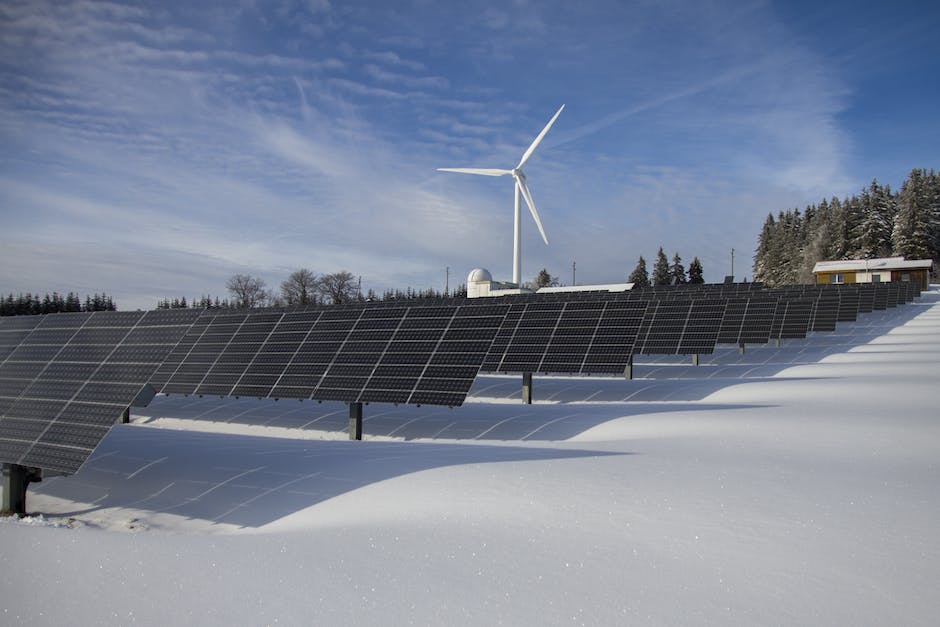Table of Contents
“Empowering the Arab world with sustainable energy solutions.”
Introduction
Arab Leaders in Renewable Energy: Harnessing the Power of Sustainability
Renewable energy has emerged as a crucial aspect of sustainable development, and Arab leaders have recognized its potential to address the region’s energy needs while mitigating environmental impacts. With abundant solar and wind resources, Arab countries have made significant strides in harnessing renewable energy sources. This introduction explores the efforts and initiatives undertaken by Arab leaders to promote renewable energy, highlighting their commitment to sustainable development and the transition towards a greener future.
The Role of Arab Leaders in Promoting Renewable Energy

The Arab world has long been associated with its vast reserves of oil and gas, making it a major player in the global energy market. However, in recent years, there has been a growing recognition among Arab leaders of the need to diversify their energy sources and embrace renewable energy. This shift towards sustainability is not only driven by environmental concerns but also by the economic and geopolitical advantages that renewable energy offers.
Arab leaders have been actively promoting renewable energy as a means to reduce their dependence on fossil fuels and mitigate the impact of climate change. One of the key drivers behind this push is the realization that the region’s oil and gas reserves are finite and will eventually run out. By investing in renewable energy, Arab countries can ensure a more sustainable future for their economies and reduce their vulnerability to fluctuations in global oil prices.
In addition to the economic benefits, Arab leaders also recognize the geopolitical advantages of embracing renewable energy. By reducing their reliance on fossil fuels, Arab countries can enhance their energy security and reduce their vulnerability to political instability in oil-producing regions. This is particularly important given the volatile nature of the Middle East, where conflicts and tensions often disrupt oil supplies. By investing in renewable energy, Arab countries can become more self-sufficient and less reliant on external sources of energy.
Arab leaders have taken several steps to promote renewable energy within their countries. One of the most notable initiatives is the establishment of renewable energy targets. Many Arab countries have set ambitious goals to increase the share of renewable energy in their energy mix. For example, Saudi Arabia aims to generate 50% of its electricity from renewable sources by 2032, while the United Arab Emirates has set a target of 44% by 2050. These targets provide a clear roadmap for the development of renewable energy and send a strong signal to investors and the international community about the commitment of Arab countries to sustainability.
To achieve these targets, Arab leaders have implemented a range of policies and incentives to attract investment in renewable energy. These include feed-in tariffs, tax incentives, and streamlined regulatory processes. Arab countries have also established dedicated institutions and funds to support the development of renewable energy projects. For example, the Abu Dhabi Future Energy Company, also known as Masdar, has been instrumental in driving the development of renewable energy in the United Arab Emirates and beyond.
Furthermore, Arab leaders have recognized the importance of international cooperation in promoting renewable energy. They have actively engaged with international organizations and initiatives to share knowledge and best practices, as well as to attract foreign investment. For example, the International Renewable Energy Agency (IRENA), headquartered in Abu Dhabi, has played a crucial role in facilitating collaboration and knowledge exchange among Arab countries and the global renewable energy community.
In conclusion, Arab leaders have embraced the potential of renewable energy to transform their economies and enhance their energy security. By setting ambitious targets, implementing supportive policies, and engaging in international cooperation, Arab countries are harnessing the power of sustainability. This shift towards renewable energy not only benefits the environment but also offers economic and geopolitical advantages. As the world transitions towards a more sustainable future, Arab leaders are positioning their countries as leaders in renewable energy.
Advancements in Renewable Energy Technologies by Arab Leaders
Arab Leaders in Renewable Energy: Harnessing the Power of Sustainability
Renewable energy technologies have become a global priority as countries strive to reduce their carbon footprint and transition to a more sustainable future. Arab leaders have recognized the importance of renewable energy and have made significant advancements in this field. Through their commitment to harnessing the power of sustainability, Arab countries are not only contributing to the global effort to combat climate change but also reaping the economic benefits of renewable energy.
One of the key advancements made by Arab leaders in renewable energy technologies is the development of solar power. With abundant sunlight throughout the year, Arab countries have capitalized on this natural resource to generate clean and sustainable energy. The United Arab Emirates, for example, is home to the world’s largest single-site solar park, the Mohammed bin Rashid Al Maktoum Solar Park. This impressive facility has a capacity of 5,000 megawatts and is a testament to the UAE’s commitment to renewable energy.
In addition to solar power, Arab leaders have also made significant progress in wind energy. Countries such as Egypt, Morocco, and Jordan have invested in wind farms and are reaping the benefits of this renewable energy source. Egypt, for instance, has the largest wind farm in Africa, the Gabal El-Zeit Wind Farm, which has a capacity of 580 megawatts. These wind farms not only provide clean energy but also create job opportunities and stimulate economic growth.
Another area where Arab leaders have shown great innovation is in the field of hydroelectric power. While the region may not have an abundance of rivers, countries like Lebanon and Jordan have successfully harnessed the power of their water resources to generate electricity. The Litani River in Lebanon, for example, has been tapped to produce hydroelectric power, contributing to the country’s renewable energy goals.
Furthermore, Arab leaders have recognized the potential of geothermal energy and have started exploring this renewable energy source. Geothermal energy harnesses the heat from the Earth’s core to generate electricity and heat buildings. Countries like Saudi Arabia and Oman have geothermal projects in the pipeline, demonstrating their commitment to diversifying their energy sources and reducing their reliance on fossil fuels.
The advancements made by Arab leaders in renewable energy technologies have not only contributed to a more sustainable future but have also brought about economic benefits. The development of renewable energy infrastructure has created job opportunities and stimulated economic growth. For instance, the renewable energy sector in the UAE is expected to create thousands of jobs and attract billions of dollars in investments.
Moreover, Arab countries are also exporting their renewable energy technologies and expertise to other regions. The UAE, for example, has established partnerships with countries in Africa and Asia to share their knowledge and help them develop their renewable energy sectors. This not only strengthens diplomatic ties but also promotes sustainable development on a global scale.
In conclusion, Arab leaders have made significant advancements in renewable energy technologies, harnessing the power of sustainability. Through the development of solar power, wind energy, hydroelectric power, and exploration of geothermal energy, Arab countries are not only contributing to the global effort to combat climate change but also reaping the economic benefits of renewable energy. By exporting their expertise and technologies, Arab leaders are also promoting sustainable development on a global scale. The commitment of Arab countries to renewable energy is a testament to their vision for a greener and more sustainable future.
Challenges Faced by Arab Leaders in Implementing Renewable Energy Projects
Challenges Faced by Arab Leaders in Implementing Renewable Energy Projects
The Arab region has been making significant strides in recent years towards harnessing the power of renewable energy. With abundant solar and wind resources, countries in the Arab world have recognized the potential of transitioning to clean and sustainable energy sources. However, despite the numerous benefits of renewable energy, Arab leaders face several challenges in implementing these projects.
One of the primary challenges faced by Arab leaders is the high initial cost of renewable energy projects. While the long-term benefits of clean energy are undeniable, the upfront investment required can be substantial. Developing the necessary infrastructure, such as solar panels or wind turbines, and integrating them into the existing energy grid can be a costly endeavor. Arab leaders must find ways to secure funding for these projects, either through domestic resources or international partnerships.
Another challenge is the lack of technical expertise and knowledge in the field of renewable energy. Many Arab countries have traditionally relied on fossil fuels for their energy needs, and the transition to renewable sources requires a shift in mindset and skill set. Arab leaders must invest in training programs and educational initiatives to develop a workforce capable of designing, implementing, and maintaining renewable energy projects. Collaborating with international experts and organizations can also help bridge the knowledge gap and accelerate the adoption of clean energy technologies.
Furthermore, the intermittent nature of renewable energy sources poses a challenge for Arab leaders. Unlike fossil fuels, which can be stored and used as needed, solar and wind energy are dependent on weather conditions. This variability in supply can create instability in the energy grid and affect the reliability of electricity supply. Arab leaders must invest in energy storage technologies, such as batteries or pumped hydro storage, to store excess energy during peak production periods and ensure a consistent power supply.
Additionally, the political and regulatory environment can hinder the implementation of renewable energy projects in the Arab region. Political instability, bureaucratic red tape, and a lack of clear policies and regulations can discourage investors and delay project development. Arab leaders must create a favorable business environment by streamlining administrative processes, providing incentives for renewable energy investments, and establishing clear guidelines for project development. This will attract both domestic and foreign investors and facilitate the growth of the renewable energy sector.
Moreover, the existing energy infrastructure in many Arab countries is designed around fossil fuel-based systems. Shifting to renewable energy sources requires significant upgrades and modifications to the existing grid. Arab leaders must invest in smart grid technologies and infrastructure to accommodate the integration of renewable energy sources. This includes upgrading transmission and distribution networks, implementing advanced monitoring and control systems, and ensuring grid stability and reliability.
In conclusion, while Arab leaders recognize the importance of renewable energy in achieving sustainable development, they face several challenges in implementing these projects. Overcoming the high initial costs, developing technical expertise, addressing the intermittency of renewable energy sources, navigating the political and regulatory landscape, and upgrading the existing energy infrastructure are all crucial steps towards a successful transition to clean energy. By addressing these challenges and investing in renewable energy, Arab leaders can harness the power of sustainability and contribute to a greener and more sustainable future for their countries and the region as a whole.
Success Stories of Arab Leaders in Renewable Energy Initiatives
Arab Leaders in Renewable Energy: Harnessing the Power of Sustainability
The Arab world has long been associated with its vast reserves of oil and gas. However, in recent years, there has been a growing recognition among Arab leaders of the need to diversify their energy sources and embrace renewable energy initiatives. This shift towards sustainability has not only been driven by environmental concerns but also by the desire to reduce dependence on fossil fuels and create a more resilient and prosperous future.
One success story in the Arab world’s renewable energy journey is the United Arab Emirates (UAE). The UAE has made significant strides in harnessing the power of the sun through its ambitious solar energy projects. The country’s flagship initiative, the Mohammed bin Rashid Al Maktoum Solar Park, is one of the largest solar parks in the world. With a capacity of 5,000 megawatts (MW) by 2030, the park is set to make a significant contribution to the UAE’s renewable energy targets. The UAE’s commitment to renewable energy has not only reduced its carbon footprint but has also positioned it as a global leader in the field.
Another Arab leader in renewable energy is Morocco. The North African country has made remarkable progress in developing its renewable energy sector, particularly in wind and solar power. Morocco’s Noor Ouarzazate Solar Complex, also known as the “Solar City,” is a shining example of the country’s commitment to sustainability. The complex, which covers an area of over 3,000 hectares, has a capacity of 580 MW and is expected to provide electricity to over one million people. Morocco’s success in renewable energy has not only reduced its reliance on fossil fuels but has also created jobs and stimulated economic growth.
In addition to the UAE and Morocco, Egypt has also emerged as a leader in renewable energy initiatives. The country’s New and Renewable Energy Authority (NREA) has been instrumental in promoting and implementing renewable energy projects. Egypt’s Benban Solar Park, located in the Aswan Governorate, is the largest solar installation in Africa. With a capacity of 1.8 GW, the park is expected to reduce carbon emissions by 2 million tons per year. Egypt’s commitment to renewable energy has not only helped address its energy needs but has also positioned it as a regional hub for renewable energy investment.
The success stories of these Arab leaders in renewable energy initiatives highlight the immense potential of the region in harnessing sustainable energy sources. However, challenges remain. One of the main obstacles is the high upfront costs associated with renewable energy projects. Arab leaders have recognized this and have taken steps to attract investment and create favorable regulatory frameworks to encourage private sector participation. Additionally, capacity building and knowledge transfer have been key priorities for these countries to ensure the long-term sustainability of their renewable energy sectors.
In conclusion, Arab leaders in renewable energy have made significant progress in harnessing the power of sustainability. The UAE, Morocco, and Egypt have emerged as regional leaders in renewable energy initiatives, with ambitious projects that have not only reduced carbon emissions but also created jobs and stimulated economic growth. These success stories serve as inspiration for other countries in the region and beyond, demonstrating that a transition to renewable energy is not only necessary but also economically viable. As the world grapples with the challenges of climate change, Arab leaders are leading the way in showing that a sustainable future is within reach.
Q&A
1. What is the focus of the book “Arab Leaders in Renewable Energy: Harnessing the Power of Sustainability”?
The book focuses on Arab leaders and their efforts in harnessing renewable energy for sustainable development.
2. Who are the target readers of the book?
The book is targeted towards individuals interested in renewable energy, sustainability, and Arab leadership in this field.
3. What are some key topics covered in the book?
Some key topics covered in the book include the role of Arab leaders in promoting renewable energy, successful initiatives and projects in the Arab region, challenges and opportunities in the renewable energy sector, and the impact of renewable energy on economic and environmental sustainability.
4. What is the significance of Arab leaders’ involvement in renewable energy?
Arab leaders’ involvement in renewable energy is significant as it promotes sustainable development, reduces dependence on fossil fuels, mitigates climate change, and contributes to the overall transition towards a greener and more sustainable future.
Conclusion
In conclusion, Arab leaders have recognized the importance of renewable energy and have made significant efforts to harness its power. Through various initiatives and investments, they have demonstrated their commitment to sustainability and reducing dependence on fossil fuels. The region’s abundant solar and wind resources provide a promising foundation for the growth of renewable energy. With continued support and collaboration, Arab leaders have the potential to become global leaders in renewable energy and contribute to a more sustainable future.





Recent Comments